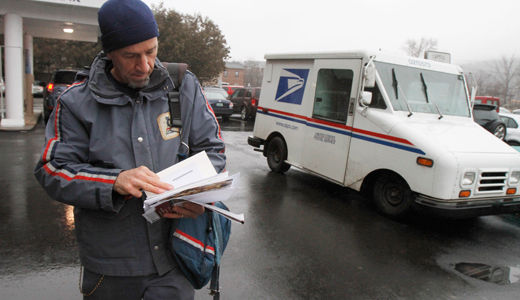
WASHINGTON (PAI) – When it comes to boosting revenues for the U.S. Postal Service – and offering an alternative to management’s slash-and-burn schemes – the nation’s four postal unions and their allies have taken at least one leaf from the movie Back to the Future.
They want the Postal Service to go back to banking, just as it did for 56 years, till 1967.
In a plan announced in January, the Letter Carriers (NALC), the Postal Workers (APWU), the Mail Handlers/Laborers, the Rural Letter Carriers, and a coalition of 15 other groups launched a campaign to get lawmakers to approve making the nation’s 31,000 post offices into financial service centers, especially for underserved and unbanked areas.
The plan is to let USPS use its cash flow and national network to offer alternatives to high-interest payday lenders, check-cashing mills, pawn shops and other extortionate services that prey upon the poor and upon those who live paycheck to paycheck – or upon people with no nearby bank branch. That’s an estimated 93 million people, 28 percent of the U.S. population, who pay $89 billion yearly to such shady services, the unions and their allies say.
Postal banking, also endorsed as a money-maker by the agency’s Inspector General in a recent report, also could appeal to new Postmaster General Megan Brennan, NALC President Fredric Rolando told a capacity crowd in his inaugural address in mid-December. He was sworn in for a second term as president of the 126-year-old union.
“I hope we can use this transition in the leadership at both the Postal Service and NALC” – the union inaugurated a new Secretary-Treasurer and new board members – “to chart a new, more constructive course for the future” of the service, Rolando said.
“We hope to convince her to see the Postal Service’s delivery, retail and processing networks as invaluable assets to be leveraged for new services, not simply cost centers to be radically minimized.” Brennan started her postal career as a Letter Carrier.
Groups that created the Campaign for Postal Banking, led by labor-backed United for a Fair Economy, say consumer inability “to cash a check, transfer money or pay a bill at a reasonable fee, leaves consumers trapped in a cycle of debt.
“Some payday lenders charge as much as 400 percent in annual interest. The average low-wage worker using these ‘legal loan sharks’ pays an incredible $2,400 per year in fees for these services,” the community-labor coalition adds.
“Much of the national debate has focused on how wages have lagged for working Americans in recent years,” said Postal Workers President Mark Dimondstein at the Jan. 19 announcement of the coalition. While the U.S. must boost wages and create living-wage
jobs, “We also need to find ways to cut costs for low-wage Americans. Postal banking is a way to cut costs and put money back into the pockets of people barely getting by,” he explained.
“From 1911-1967, the Post Office offered savings deposit accounts and currently sells more money orders than any other institution. Anyone who goes to a postal window and pays with a debit card anywhere also is offered the option of getting cash back,” the coalition notes.
Expanding USPS banking services is just one way the NALC and other postal unions are gearing up for a renewed fight, now with a totally Republican-run Congress, over the future of the USPS. Past GOP leaders campaigned to fire 100,000 workers, let another 100,000 go by attrition, eliminate Saturday pickups and deliveries and close postal sorting centers, thus slowing the mail. The prior Postmaster General closed another 82, starting on Jan. 6.
The PMG advocated those moves and others to close a reported $5 billion yearly deficit – a deficit caused solely by a GOP-mandated $5.5 billion yearly pre-payment for future retirees’ health care costs. Without it, the USPS turned a $1 billion profit. So closures are not the way to go, Rolando told the crowd. But he warned there would be fights ahead for the Letter Carriers, their allies and unionists as a whole – and not just over USPS.
“Given the results of the November election, we can expect to face continued attacks, particularly on our health benefits and pensions,” he said. “Nevertheless, we have some reason for cautious optimism on postal reform, because we have had some success in changing the debate about the Postal Service and we have built an alliance with the other postal unions” in that cause. The unions’ plan also centers around ending the pre-payment.
The four postal unions banded together last year in a first-ever joint alliance to defeat cuts pushed by former House Governmental Affairs Committee Chairman Darrell Issa, R-Calif.-a Radical Right car alarm manufacturer-and the bipartisan Senate leaders of its Govern-mental Affairs Committee. Right Wing Sen. Ron Johnson, R-Wis., now chairs that panel.
“The changing partisan makeup of the Congress does not alter the shift in the debate or the case for consensus reform,” Rolando explained. “Nonetheless, we know the legislative challenge we face in the new Congress will be great.
“NALC and the labor movement can and must do better to mobilize working-class Americans, inside and outside our ranks, to elect a president and a Congress that will finally address the crisis of America’s workers. The only way to do that is to enact policies that will help workers rebuild the labor movement,” he declared.
Meanwhile, Reps. Gerry Connolly, D-Va., and Sam Graves, R-Mo., introduced a non-binding resolution to keep Saturday postal pickups and deliveries. Connolly compared USPS elimination of Saturday service to solutions favored by 18th century physicians, “who wrongly believed that bleeding patients could save them.”
Photo: Tony Talbot/AP












Comments